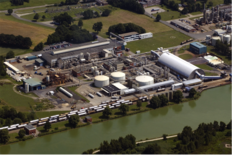- The JV will build a membrane electrolysis plant in Germany by end-2017.
- The plant will produce 130,000 metric tons of potassium hydroxide solution and 82,000 metric tons of chlorine annually.
- AkzoNobel will commercialize chlorine and hydrogen, while Evonik will handle potassium hydroxide solution.
- The project is subject to regulatory approval.

Joint Venture Overview
AkzoNobel and Evonik Industries are collaborating to build and operate a new membrane electrolysis facility in Germany. The facility will produce potassium hydroxide solution and chlorine, with operations expected to start by the end of 2017.
Production Capacity
The plant, located at AkzoNobel's site in Ibbenbüren, will have an annual capacity of approximately 130,000 metric tons of potassium hydroxide solution and 82,000 metric tons of chlorine. This venture aims to strengthen the market positions of both companies.
Commercialization and Processing
AkzoNobel will manage the commercialization of chlorine and hydrogen, processing these products directly at the Ibbenbüren site. Evonik will handle the potassium hydroxide solution, processing it into potassium carbonate at its Lülsdorf site.
Regulatory Compliance
The new plant will replace mercury-based amalgam electrolysis, which must cease by the end of 2017 due to legislative requirements. The membrane electrolysis process offers a more sustainable and environmentally friendly alternative.
Market Leadership
AkzoNobel is a market leader in industrial salt, merchant chlorine, and chloromethanes in Europe, and holds a leading position in caustic lye. Evonik leads the European market for potassium derivatives and is a global provider of alcoxides, also produced via electrolysis in Lülsdorf.
Regulatory Approval
The joint venture is pending approval from relevant regulatory authorities.

